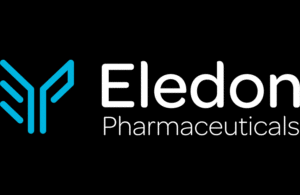 Irvine, Calif.-based Eledon Pharmaceuticals has announced promising topline results from a Phase 2a study of tegoprubart, marking the first time an investigational drug has demonstrated a reduction of inflammatory biomarkers associated with progression of amyotrophic lateral sclerosis (ALS).
Irvine, Calif.-based Eledon Pharmaceuticals has announced promising topline results from a Phase 2a study of tegoprubart, marking the first time an investigational drug has demonstrated a reduction of inflammatory biomarkers associated with progression of amyotrophic lateral sclerosis (ALS).
“We have an investigational drug acting based on what we hypothesized it would do based on the underlying biology,” said Dr. David-Alexandre Gros, CEO of Eledon. The ALS patients in the trial are “showing some clear impacts on their inflammatory signature.”

Dr. David-Alexandre Gros
Better known as Lou Gehrig’s disease, ALS affects approximately 30,000 people in the U.S., who gradually lose the ability to speak, swallow, walk or breathe independently.
Roughly 5,000 new cases are diagnosed with the disease each year.
“There’s a significant unmet need in ALS,” said Steve Perrin, president and chief scientific officer of Eledon Pharmaceuticals. “The average survival time is still about three to five years post-diagnosis.”
Eledon’s Phase 2a study indicates that the anti-CD40L antibody tegoprubart could slow disease progression based on a dose-dependent reduction in pro-inflammatory biomarkers associated with ALS.
In the open-label study, tegoprubart was also well-tolerated, with no drug-related serious or severe adverse events.
At present, there are a limited number of FDA-approved ALS drugs. In 2017, FDA approved Radicava (edaravone), the first new drug for ALS, in 22 years. Before that, Rilutek (riluzole) was the primary FDA-approved drug, which is available as a tablet, thickened liquid or oral film. “That drug has been on the market for quite some time, and the data are not showing a dramatic, if any, improvement in slowing down disease or improving survival time,” Perrin said.
Tegoprubart, formerly known as AT-1501, also has a unique history. The molecule is the first investigational drug discovered by the nonprofit ALS Therapy Development Institute (ALS TDI) to be tested in clinical trials. After ALS TDI discovered AT-1501, the nonprofit biotech licensed it to Anelixis Therapeutics, which completed Phase 1 studies of it in 2019. Eledon Pharmaceuticals would go on to acquire Anelixis in 2020.

Steve Perrin
In 2007, Perrin was recruited by Augie Nieto, a fitness industry pioneer who was diagnosed with ALS in 2005, to join ALS TDI. Nieto, the chairman of ALS TDI, approached Perrin, asking what the nonprofit could do with $100 million. “I was honest with him,” Perrin recalled. “I said, ‘Look, Auggie, that might get you one drug into the clinic, and it’ll have a 50/50 shot of showing an effect.'”
The conversation ultimately led to ALS TDI recruiting Perrin. “We built the world’s largest preclinical target-identification drug-development group focused on ALS,” he said.
ALS TDI researchers first focused on animal models, discovering that the immune system recognizes denervated nerves in animal models of ALS and that it was mediated by CD40 ligand signaling.
In animal models, ALS TDI scientists observed macrophages recognizing denervated nerves and then eliminating them by phagocytosis, a cellular process for consuming and eliminating particles. Also, as part of the process, T cells become activated, turning pro-inflammatory and crossing the blood-brain barrier to activate inflammation in the central nervous system. The process leads to the “demise of the motor neuron — both in the spinal cord as well as in the muscle beds,” Perrin said.
In tests on rodents, the CD40 ligand became the first drug candidate ALS TDI tested to slow down disease progression and improve survival. “We had already tested 300 drugs in the animal model, and none had done anything,” Perrin said. “So we were very, very excited about that effect.”
A second generation of the antibody would eventually become tegoprubart, which was the focus of the recent Phase 2a study.
“The nice thing about our study, which was incredibly exciting, is we checked a critical box in drug development for ALS,” Perrin said. “We showed a potent target engagement for CD40 ligand itself, which is expressed on the T cell. In addition, when this pathway is activated, CD40 ligand activates B cells via its receptor, and you can look and see if you’ve knocked on B cell activation as well, which we did with CXCL13.”
CXCL13 is a B and T lymphocyte chemokine involved in neuroinflammation.
Eledon’s second hypothesis was that blocking CD40 ligand signaling with tegoprubart could impact downstream pro-inflammatory markers. “We knew that based on years of publications from people with ALS that there are pro-inflammatory markers that are highly expressed,” Perrin said. Such molecules include TNF alpha, monocyte chemoattractant protein-1 (MCP1) and receptor for advanced glycation endproducts (RAGE). “We knocked those down,” Perrin added. “We knocked down 23 of 32 pro-inflammatory markers downstream of CD40 ligand signaling quite robustly.”
Filed Under: clinical trials, Drug Discovery, Neurological Disease





Tell Us What You Think!
You must be logged in to post a comment.